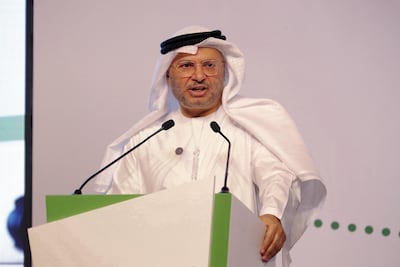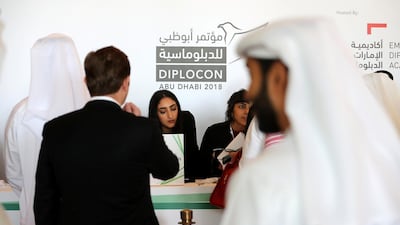A new network to challenge a diplomatic “boys' club” will be set up in the UAE after new research showed that fewer than one in five global representatives are women.
The study, carried out by the Emirates Diplomatic Academy, was unveiled on the first day of the institution’s first conference - Diplocon - at which hundreds of delegates from across the globe gathered to discuss the future of diplomacy.
It was revealed that of 2,607 ambassadors from G20 countries, only 435 - or 16.7 per cent - are women. Female diplomats were also less likely to secure the most prestigious postings, it was found.
While Australia and Canada were identified as the countries with the highest percentage of female diplomats, both with slightly over 35 per cent, Saudi Arabia came bottom of a global league table of advanced economies for gender equality with no women ambassadors, while Russia had only one.
When it came to posting women to other G20 countries, Brazil, China and Japan had no women in the sought-after roles.
The UAE has seven female ambassadors but a much higher number of female diplomatic staff - 38 per cent in the Ministry of Foreign Affairs now women, the event heard.
In addition, at least than six in ten graduates from the academy, responsible for training the next generation of UAE ambassadors, were women last year.
“While women diplomats have made strides the field of diplomacy, clearly, it is still dominated by men,” Dr Nawal Al Hosany, deputy director of the academy, said.
“In fact, several countries have few or no women serving as ambassadors.
“Things are certainly progressing, both in the region and across the world. The research shows just that. Simply put, we must address challenges and see that opportunities are leveraged. With that, I’m very proud to announce the launch of the Women in Diplomacy Network.
“It will be a global platform that works towards ensuring female diplomats excel in their careers. Ultimately, it is our vision that the network will offer practical solutions that make an impact. I’m confident it will serve as a tool of empowerment for aspiring and practising female diplomats.”
________________
Read more:
Hundreds to attend Abu Dhabi's diplomatic convention
We need to break the diplomatic glass ceiling, UAE academy chief says
________________
The research on gender balance in diplomacy will be updated and published every year, Dr Al Hosany, who is also the UAE’s permanent representative to the International Renewable Energy Agency, said. She said this would allow governments across the world to monitor progress and help them share best practice.
Around 60 ambassadors are attending the two-day Diplocon, along with 25 undersecretaries. More than 100 countries are represented at the event.
Gender in diplomacy is one of the major themes in the conference, alongside technology, training and culture. Jean Dunn, a former Australian ambassador, said her country had made progress after recognising that diplomacy was viewed as a “man’s world” and taking steps, such as banning interrupting in foreign ministry meetings, to make the department more female friendly.

Dr Anwar Gargash, Minister of State for Foreign Affairs, who gave a keynote address, said he believed more and more “able and capable women” would go on to represent the country abroad in future.
“People will say Burj Khalifa or the Louvre [is the UAE’s greatest success]”, he said.
“We’ll also build the biggest malls, but what has happened in this country is more than skin deep. You can see it in people’s health, education and more cosmopolitan nature, people have actually changed.
“If I had to say one thing that I would consider as one of the UAE’s greatest achievements, it’s our record in enabling women. We’ve been able to do that very successfully, in a conservative, Arab, Muslim society - breaking all stereotypes. I think this has been a huge success for us, and it says a lot about who you are and where you want to be in this world.
“We are seeing this clearly in our diplomatic service. We have many successful ambassadors who are women and doing a great job. We have many young diplomats who are aspiring. I think this is extremely important.”



